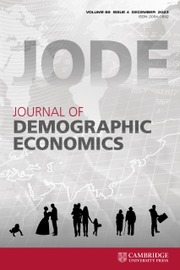Article contents
ARE WE COUNTING ALL THE POOR?
Accounting for the Intra-Household Allocation of Consumption in Burundi
Published online by Cambridge University Press: 24 August 2017
Abstract
Having accurate poverty statistics is of primary importance for researchers and policy-makers. Based on original data on Burundi, we investigate the sensitivity of poverty headcount calculations to considering individual- instead of household-level consumption. Relying on a survey module which provides information on the share of expenses allocated to each member of the households, we calculate poverty statutes on an individual basis. Exploiting these direct measures to compute poverty headcounts allows us to put forward the discrepancy between individual- and household-level poverty computations. We identify “hidden poor,” i.e. poor individuals living in non-poor households, and show that they are predominantly children. We finally discuss potential mechanisms that could drive the results, and emphasize the importance of improving data collection devices for poverty-related policy making.
- Type
- Shorter Paper
- Information
- Copyright
- Copyright © Université catholique de Louvain 2017
Footnotes
The data used in this paper were collected in an FNRS research project on longitudinal and intra-household dynamics. We thank FNRS for their support. We extend our appreciation to Lionel Rama Ngenzebuke for insightful discussions as well as our many Burundese research assistants for their input and effort in the data collection.
Marion Mercier acknowledges support from the ARC project 15/19-063 on “Family transformations” (French speaking community of Belgium).
References
REFERENCES
- 8
- Cited by


